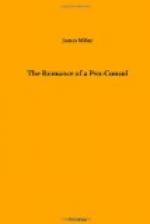Sir George Grey found himself reinforced, in so believing, by the opinion of General Grant. This he heard from Sir T. Fowell Buxton; who had travelled in America with Mr. W. E. Forster, while Grant was President. The General took his English visitors for a drive, and his talk was of military matters and his horses, until they were nearly back at Washington. Suddenly, he went off on the subject of an alliance between Great Britain and the United States, his hopes and expectations of it. He added that he should not live to witness the drawing together, but he was certain it must become a great power in the world, especially on sea.
‘Well,’ Sir George commented, ’if General Grant, a man of singularly practical character, was among the prophets, I am quite content to be in his company.’
When he talked of the federation of the British Empire, or of the larger welding in which he had belief, Sir George would declare, ’No good service is rendered by creating difficulties ahead. We may be certain of this that each generation, as it comes rolling on, will hold its own views upon every subject, differing widely, perhaps, from the views of its predecessors. The essential thing, in all government, is to secure to the people at large, the power of enacting the laws they deem to be the wisest and best suited to the circumstances of their age.’
Thus, while he had worked out definite lines of federation, he was content if principles were accepted. ‘No man,’ he argued, ’should presume to lay down the law in such a matter; just let the vision be realised by natural process. Be there the hewing of materials, and the building would follow by and by. If it were possible to solidify the English-speaking people for common purposes, the gain to them, and to mankind, would be splendid. The blessings of federation were a hundredfold.
‘Why,’ said Sir George, ’war would practically die off the face of the earth. The armed camp which burdens the Old World, enslaves the nations, and impedes progress, would disappear. The Anglo-Saxon race, going together, could determine the balance of power for a fully peopled earth. Such a moral force would be irresistible, and debate would take the place of war, in the settlement of international disputes. If the arbitrament of reason, ousts the arbitrament of war, a new and beautiful world is unveiled.’
It was because Sir George saw, in federation, a vista of brighter life for the masses, that he was so persuaded an advocate of it, so keen a believer in its realisation. As a result of the cohesion of the race, we should have all life quickened and developed; unemployed energies called into action in many places where they lay stagnant. Below federation, the very essence of it, was decentralisation, the getting of the people fairly spread over the earth, not huddled into a few places where decay would follow overcrowding.




